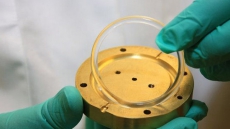Researchers have identified a critical gene that could help clinicians distinguish fibroadenomas cases from breast cancer. Fibroadenomas is the most common benign breast tumour in women of reproductive age.
The researchers used advanced DNA sequencing technologies to identify the gene called MED12 that was repeatedly disrupted in nearly 60 percent of fibroadenoma cases.
"It is amazing that these common breast tumours can be caused by such a precise disruption in a single gene. Our findings show that even common diseases can have a very exact genetic basis. Importantly, now that we know the cause of fibroadenoma, this research can have many potential applications," said professor Tan Puay Hoon from Singapore General Hospital.
For example, measuring the MED12 gene in breast lumps may help clinicians to distinguish fibroadenomas from other types of breast cancer, Tan added.
“Drugs targeting the MED12 pathway may also be useful in patients with multiple and recurrent fibroadenomas as this could help patients avoid surgery and relieve anxiety,” Tan noted.
The researchers began a study to identify if there are any genetic abnormalities in fibroadenomas that may be used to differentiate them.
By analysing all the protein-coding genes in a panel of fibroadenomas from Singapore patients, the team identified frequent mutations in a gene called MED12 in a remarkable 60 percent of fibroadenomas.
The findings have also deepened the conceptual understanding of how tumours can develop.
Like most breast tumours including breast cancers, fibroadenomas consist of a mixed population of different cell types, called epithelial cells and stromal cells.
However, unlike breast cancers where the genetic abnormalities arise from the epithelial cells, the scientists, using a technique called laser capture microdissection (LCM), showed that the pivotal MED12 mutations in fibroadenomas are found in the stromal cells.
The study appeared in the journal Nature Genetics.





